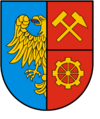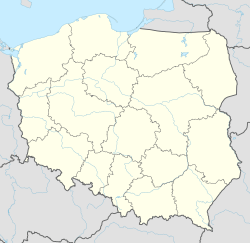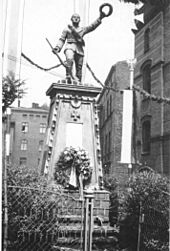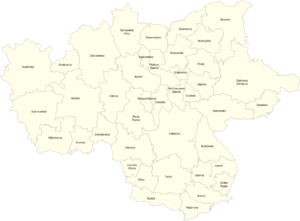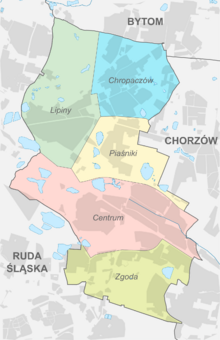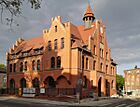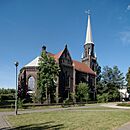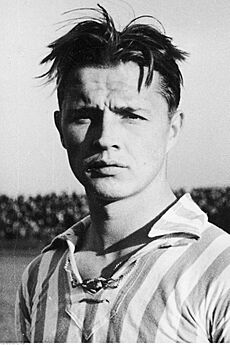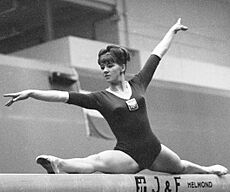Świętochłowice facts for kids
Quick facts for kids
Świętochłowice
Świyntochłowice (Silesian)
|
|||
|---|---|---|---|
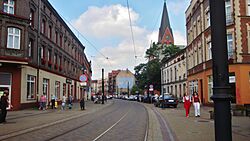
Downtown
|
|||
|
|||
| Country | |||
| Voivodeship | |||
| County | city county | ||
| Established | 12th century | ||
| First mentioned | 1313 | ||
| City rights | 1947 | ||
| Area | |||
| • City | 13.31 km2 (5.14 sq mi) | ||
| Population
(2019-06-30)
|
|||
| • City | 49,762 | ||
| • Density | 3,738.7/km2 (9,683/sq mi) | ||
| • Urban | 2,746,000 | ||
| • Metro | 4,620,624 | ||
| Time zone | UTC+1 (CET) | ||
| • Summer (DST) | UTC+2 (CEST) | ||
| Postal code |
41-600 to 41-608
|
||
| Area code(s) | +48 32 | ||
| Car plates | SW | ||
| Primary airport | Katowice Airport | ||
Świętochłowice (pronounced shfyen-toh-KHWO-vee-tseh) is a city in southern Poland. It is located in the Silesia region, close to Katowice. This city is part of a large urban area called the Metropolis GZM. This area has about 2 million people.
Świętochłowice sits on the Silesian Highlands. The Rawa River, which flows into the Vistula River, runs through it. Since 1999, it has been part of the Silesian Voivodeship. Before that, it was in the Katowice Voivodeship. The city is part of a bigger urban area with over 5 million people. In 2019, Świętochłowice had a population of 49,762.
Contents
History of Świętochłowice
Świętochłowice started as two separate parts. These were called Little Świętochłowice and Big Świętochłowice. They date back to the 12th and 13th centuries. The city was first mentioned in records in 1313. Another area, Chropaczów, was mentioned even earlier in 1295.
Early Beginnings and Polish Rule
Both settlements were part of the Polish Kingdom. They were ruled by the Piast family until 1532. The village gained special city rights around the late 1200s or early 1300s. Different families owned the village until the late 1600s.
Prussian Control and Industrial Growth
In 1742, Prussia took control of the area. From 1871 to 1922, it was part of Germany. The two parts of Świętochłowice joined together in 1790. In the 1800s, the area grew quickly. This was because of industries like coal mining and zinc production. The village became an important industrial town.
Return to Poland and World War II
In the early 1900s, many Polish groups were formed here. During the Silesian Uprisings, Polish fighters took control of areas like Lipiny and Piaśniki in 1920. In 1922, these areas became part of the newly independent Polish state. Świętochłowice was officially granted city rights in 1947.
In September 1939, Germany invaded Poland, starting World War II. Świętochłowice was defended by Polish soldiers and civilians. German troops killed ten Poles in the city early in the war. The city was then occupied by Germany. During this time, a forced labor camp was set up there.
After the war, Świętochłowice became part of Poland again. In 1951, its city limits grew. Chropaczów and Lipiny became new districts of the city.
Location of Świętochłowice
Świętochłowice is in the middle of Upper Silesia, a very populated region. It is part of the Metropolis GZM. This is the largest urban area in Poland. It is also one of the biggest in Europe.
Population Facts
In 2013, Świętochłowice had about 53,000 people. This makes it the city with the highest population density in Poland. This means many people live in a small area. The population of the whole urban area is about 3.5 million.
Climate and Soil
Świętochłowice has a climate typical of the Silesian-Krakowian region. About 700 millimeters (27.5 inches) of rain falls each year. July is usually the wettest month. February is the driest.
The average temperature in January is about -2.5°C (27.5°F). In July, it is about 18°C (64.4°F). The main types of soil in Świętochłowice are brown and swampy soils.
City Districts
Świętochłowice is divided into five main areas. These are called administrative subdivisions:
- Centrum
- Chropaczów
- Lipiny
- Piaśniki
- Zgoda
Places to See
The Silesian Uprisings Museum is in Świętochłowice. It tells the story of the Silesian Uprisings from 1919 to 1921. The city also has old industrial buildings. You can see town halls, churches, and traditional tenement houses. There are also unique workers' homes called familoks.
Sports in Świętochłowice
The most popular sport in Świętochłowice is motorcycle speedway. This is a type of motorcycle racing. The main stadium, Skałka Stadium, is in the Centrum district.
Local Sports Clubs
Świętochłowice has several sports clubs:
- Śląsk Świętochłowice – Plays football and speedway.
- Naprzód Lipiny – Plays football.
- Czarni Świętochłowice – Plays football.
Olympic Athletes from Świętochłowice
Many athletes from Świętochłowice have competed in the Olympic Games:
- 1928 – Amsterdam
- Football – Teodor Peterek
- Gymnastics – Paweł Galus, Franiciszek Pampuch, Teofil Rost, Franciszek Tajstra
- 1936 – Berlin
- Football – Hubert Gad, Ryszard Piec, Teodor Peterek
- Gymnastics – Klara Sierońska-Kostrzewa
- 1952 – Helsinki
- Football – Ewald Cebula
- Swimming – Gotfryd Gremlowski
- 1956 – Melbourne
- Gymnastics – Małgorzata Błaszczyk-Wasilewska
- 1960 – Rome
- Football – Roman Lentner
- 1964 – Tokyo
- Gymnastics – Gerda Bryłka-Krajciczek, Małgorzata Wilczek-Rogoń
- 1976 – Montreal
- Fencing – Barbara Wysoczańska
- Weightlifting – Leszek Skorupa
- 1976 – Innsbruck
- Ice-hockey – Kordian Jajszczok
- 1980 – Moscow
- Fencing – Barbara Wysoczańska
Famous People from Świętochłowice
- Ewald Cebula (1917–2004), a famous football player.
- Krzysztof Hanke (born 1957), an actor and comedian.
- Teodor Peterek (1910–1969), another well-known football player.
- Paweł Waloszek (1938–2018), a motorcycle speedway rider.
Sister Cities
Świętochłowice has special partnerships with other cities around the world. These are called "sister cities":
 Heiloo, Netherlands
Heiloo, Netherlands Laa an der Thaya, Austria
Laa an der Thaya, Austria Nový Jičín, Czech Republic
Nový Jičín, Czech Republic Rimavská Sobota, Slovakia
Rimavská Sobota, Slovakia Tai'an, China
Tai'an, China Tiszaújváros, Hungary
Tiszaújváros, Hungary Torez, Ukraine
Torez, Ukraine
See also
 In Spanish: Świętochłowice para niños
In Spanish: Świętochłowice para niños
 | Misty Copeland |
 | Raven Wilkinson |
 | Debra Austin |
 | Aesha Ash |



